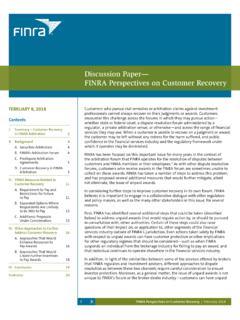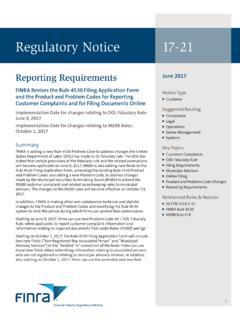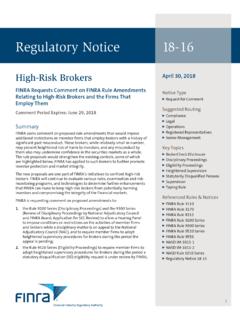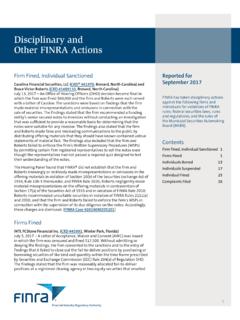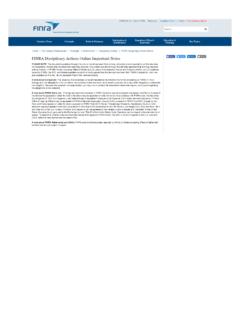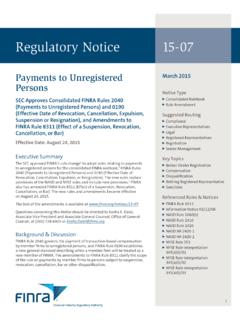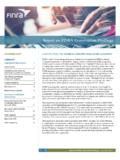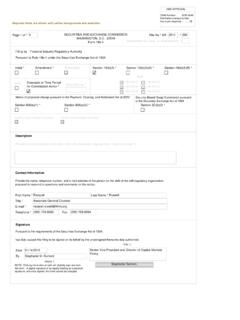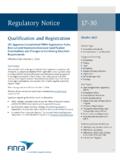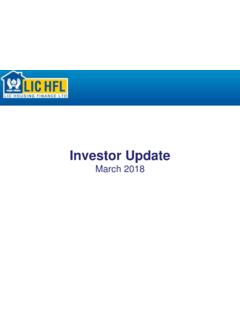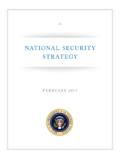Transcription of Firms Fined, Individuals Sanctioned Reported for June 2018
1 1 Disciplinary and Other FINRA ActionsFirms Fined, Individuals Sanctioned Reef Securities, Inc. (CRD #31951, Richardson, Texas) and Paul Frank Mauceli Jr. (CRD #2330829, Garland, Texas)April 11, 2018 A Letter of Acceptance, Waiver and Consent (AWC) was issued in which the firm was censured and fined $40,000. Mauceli was fined $5,000 and suspended from association with any FINRA member in any principal capacity for four months. Without admitting or denying the findings, the firm and Mauceli consented to the sanctions and to the entry of findings that the firm, acting through Mauceli, the firm s president, failed to notify investors in a timely manner of a right of rescission following the issuance of an updated general partners audited balance sheet and approval of a revised prospectus.
2 The findings stated that the firm served as the broker-dealer selling an oil and gas drilling and income fund limited partnership for an issuer. The firm, acting through Mauceli and the issuer, decided not to send the revised prospectus and a notice offering each investor an opportunity to confirm or rescind his or her investment decision, despite the requirements of the prospectus, due to low prices in the oil and gas market. FINRA discovered that the firm had not provided the revised prospectus and notice to the vast majority of the investors in the income fund. After FINRA raised the issue, the firm eventually sent the revised prospectus and notice to the remaining investors, whereupon several investors rescinded their investment. The findings also stated that the firm distributed communications related to a real estate investment trust offering to investors that failed to provide balanced presentation or a sound basis for evaluating the investments being promoted, contained misleading and unwarranted claims and, in addition, made prohibited investor profit suspension is in effect from May 7, 2018, through September 6, 2018.
3 (FINRA Case #2015043469001) Firms FinedLombard Securities Incorporated (CRD #27954, Baltimore, Maryland) April 2, 2018 An AWC was issued in which the firm was censured and fined $10,000. Without admitting or denying the findings, the firm consented to the sanctions and to the entry of findings that it executed municipal securities transactions without having a Municipal Securities Principal at the firm. The findings stated that the firm failed to establish and maintain a supervisory system and written procedures reasonably designed to supervise municipal FINRA has taken disciplinary actions against the following Firms and Individuals for violations of FINRA rules; federal securities laws, rules and regulations; and the rules of the Municipal Securities Rulemaking Board (MSRB). Reported for June 20182 Disciplinary and Other FINRA Actions cd2D R securities transactions.
4 The firm s procedures improperly delegated responsibility for reviewing municipal securities transactions to a principal who did not hold a Municipal Securities Principal license. In addition, the firm permitted another principal, who also was not a registered Municipal Securities Principal, to review and approve municipal securities transactions. (FINRA Case #2016047661702)Merrill Lynch, Pierce, Fenner & Smith Incorporated (CRD #7691, New York, New York)April 6, 2018 An AWC was issued in which the firm was censured, fined $115,000 and required to revise its written supervisory procedures (WSPs). Without admitting or denying the findings, the firm consented to the sanctions and to the entry of findings that it failed to establish, maintain and enforce written policies and procedures that were reasonably designed to prevent trade-throughs of protected quotations in National Market System (NMS) stocks that do not fall within any applicable exception, and if relying on an exception, were reasonably designed to assure compliance with the terms of the exception.
5 The findings stated that the firm failed to take reasonable steps to establish that the intermarket sweep orders it routed met the definitional requirements set forth in Rule 600(b)(30) of Regulation NMS. The firm experienced four systems issues that gave rise to certain of the above violations. In connection with one of the systems issues, the firm became aware in June 2007 that its smart order router would limit the total share quantity of its Regulation NMS sweep obligation to the share quantity of the relevant underlying customer facilitation trade. Thus, in cases where the quantity of superior protected quotations in the market was greater than the quantity of shares in the underlying customer facilitation trade, the firm s smart order router may not have routed intermarket sweep orders to all superior protected quotations in the market or to the full size of all superior protected quotations in the market, resulting in trade-throughs of those protected quotations.
6 The firm failed to recognize the scope of the issue and assigned it a low priority for later remediation. The firm did not remediate the issue until March 2014. The firm also Reported four trades with Trade Through Exempt modifiers to the FINRA Trade Reporting Facility (TRF ) when, in fact, the transactions were not exempt. (FINRA Case #2013037652201)Simmons First Investment Group, Inc. (CRD #47439, Little Rock, Arkansas) April 10, 2018 An AWC was issued in which the firm was censured and fined $200,000. Without admitting or denying the findings, the firm consented to the sanctions and to the entry of findings that it failed to establish and implement an anti-money laundering (AML) program that could reasonably be expected to detect and cause the reporting of suspicious transactions occurring in accounts connected to one of its customers.
7 The findings stated that this customer s accounts represented the vast majority of the firm s money movement activities. The firm did not adequately detect and investigate potentially suspicious transactions occurring in the customer s accounts for purposes of determining whether to file suspicious activity reports (SARs). The failure is significant because SARs are designed to flag possible money laundering or other potentially criminal activity to the Disciplinary and Other FINRA Actions 3 cd2D R Financial Crimes Enforcement Network (FinCEN). The accounts were opened to engage in securities transactions with the investment objective of income. Despite the investment objective, the accounts engaged almost exclusively in banking activity, consisting of $90 million in deposits and $84 million in withdrawals.
8 This banking activity involved hundreds of transactions, including transfers to and from potential politically exposed persons and to and from the accounts of Individuals and entities located in bank secrecy havens or countries identified as presenting money-laundering risks. The firm understood that the owners of the accounts engaged in a type of international business activity that presented an increased risk of transactions being tainted by corruption or bribery. However, because of the customer s long-standing relationship with the firm and its affiliated bank, the firm presumed the transactions had a legitimate business purpose. The firm generally did not seek to confirm the legitimacy of transfers to or from potential politically exposed persons, or to or from countries deemed to pose money-laundering risks.
9 Because of this long-standing relationship and the firm s knowledge of the customer s business activities, any potentially suspicious transactions that appeared on the daily AML reports were typically approved without further investigation into the apparent business or otherwise lawful purpose of transactions that triggered red flags of potentially suspicious activity. Due to the firm s presumptions regarding the legitimacy of the activity, it essentially relied on its clearing firm to review these accounts for suspicious activities. Absent questions from the clearing firm, the firm assumed that an SAR filing was unnecessary. The firm did not understand its own independent obligation to review the transactions for suspicious activity, believing that the clearing firm s lack of inquiry signaled that the transactions were not reportable.
10 The firm similarly did not document the reasons for its conclusions regarding whether an SAR should be filed. The firm inadequately implemented its AML written procedures because it did not adequately investigate the potentially suspicious money movement identified in its AML reports, and it did not report, if appropriate, the activity in the accounts. The findings also stated that although the firm conducted annual independent tests of its AML compliance programs, the tests were inadequate. The tests did not review account activity or money movements for any of the firm s accounts. As a result, the tests did not determine whether potential suspicious activity was being adequately detected, monitored and investigated. This significant gap in the testing prevented the firm from discovering that the written AML procedures were not being implemented.
